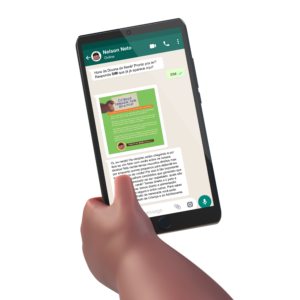WhatsApp Baby Nelson reminds Brazilians to be active caregivers
Nudges with humour include talking to adults as “former babies”
Nudges with humour include talking to adults as “former babies”

How many of us know that exercising regularly promotes physical and mental health – and yet, how many of us actually exercise regularly? Behavioural science proves that knowledge is not synonymous with putting what you know into practice. The same is true of parenting. At the Maria Cecilia Souto Vidigal Foundation, we set out to create an effective campaign, both simple and scalable, that would help remind people to put into practice with their young children the behaviours they already know are good. To front our campaign, we chose to create a virtual character – a baby called Nelson Neto (“Nelson the Baby”) or sometimes Nenê do Zap (“WhatsApp Baby”).
Through his online content, Nelson promotes caregiving practices that relate to the five dimensions of the Nurturing Care Framework developed by the World Health Organization, UNICEF and the World Bank: health, nutrition, responsive care, safety, and opportunities for early childhood interaction.

The work of behavioural scientists such as Thaler and Kahneman makes clear that behaviour changes take time and need to be built layer by layer, constantly and with a long-term view. Understanding the importance of constant interventions helped us to determine the frequency with which Nelson posts new content.
We launched Nelson on WhatsApp, the major communications platform in Brazil, on 4 March, 2020 – just before the pandemic hit. He now reaches around 2,000 people every week on WhatsApp and has various other social media channels: he has more than 24,000 followers on Instagram and 38,000 on Facebook, together reaching over 6 million people monthly. If you search for @nelsononene on social media, you will see that he is a baby with
We post content every day, in which Nelson raises awareness about the importance of early childhood. Nelson uses humour to remind parents to do what they are already aware they should be doing. He addresses adults as “former babies” (“ex-nenês”), for example, to remind us that we all were babies once. Here is a translation of how Nelson reminds people of the importance of talking to babies:
Talking, cuddles, and kisses are as important as eating and sleeping. When we have an adult who accompanies our discoveries and learning very closely, giving us care and love, we grow up healthier, happier, and more confident. Did you know that 90% of our brain develops in the first years of life? It’s for real! Until the age of 6, we learn a lot of things, and affection is fundamental for us children to feel safe and protected. This is why I send tips and information for those adults that have once upon a time been children … I think they don’t remember anymore what it’s like to be a child!
Nelson the Baby is a national initiative aimed at fathers, mothers and caregivers of children up to 6 years old, especially in more vulnerable socioeconomic groups. Nelson encourages parents and caregivers to talk and interact with their babies from birth, long before the baby can speak their first words. Once children are able to talk, he also encourages active listening by parents and caregivers.
“Nelson uses humour to remind parents to do what they are already aware they should be doing.”
Nelson delivers his messages in a variety of formats. As Nenê Sincero (“honest baby”), he tells adults truths they need to hear. In the Tuto do Nenê (“baby’s tutorial”) series, he brings tips and suggestions for easy-to-make foods that can be prepared with children’s help. The tutorial videos are our most saved and shared content on social media – a crucial engagement indicator, as it suggests that the public saves the material to use later with the child.
In Nenê Sincero’s “difficult conversations”, Nelson changes his playful and energetic tone to a more pensive one. The idea was born out of an experiment we conducted during Covid-19: Nelson shared how living through the pandemic was making him feel insecure and he gave caregivers tips on approaching the issue with children. This generated a lot of comments, and we saw there was demand for similar content. Since then, we’ve talked about subjects such as anger, war and absent fathers.

Early evidence also suggests that Nelson’s content is inspiring parents to read to their children, learn new games and pay attention to their responses to stimuli. They have begun to search Nelson’s social profiles for specific tips. Many people have mentioned on social media that they see physical and emotional traits of their own children in Nelson, which shows us that Nelson has characteristics that bring him closer to his target audience.
“Nelson encourages parents and caregivers to talk and interact with their babies from birth, long before the baby can speak their first words.”
Nelson’s gestation period took much longer than the classic 40 weeks. His birth depended on an interdisciplinary team, which included artists and experts on communications and early childhood. Just as the arrival of a baby changes a family, Nelson’s arrival inaugurated a new phase at the Maria Cecilia Souto Vidigal Foundation, which has the mission of positively impacting the development of children during their first years of life. This was our first strategy to speak directly with underprivileged families.
We know that behaviour changes take time and require messages to be reinforced from a variety of angles. During the pandemic, for example, we experimented with hip-hop songs to reinforce messages countering the misinformation that babies did not get sick from Covid-19 and urging everyone over 2 years old to use a mask and alcohol gel. These proved highly popular, and we continue to develop new approaches for Nelson – including working on a comic book and a television series.
Nelson’s universe will be expanded. The public will soon meet his mother, his father, his sisters, and his dog. He will also have a grandfather, his father’s father, called Seu Nenê – which is both a masculine term of endearment and an affectionate nickname meaning “your baby”. The name was thought up to reinforce the importance of ancestry (mainly male), which is a challenging aspect of life in some communities in Brazil. Other characters are being created, such as friends, community members, and people at Nelson’s daycare. Our intention is to contextualise Nelson’s experiences and deepen engagement on topics such as pregnancy care, respect for differences, safety, and the impacts of stress.
“(Nelson) was our first strategy to speak directly with underprivileged families”.
Nelson, however, won’t grow up. We want him to stay a baby so that he can continue his mission to represent the rights and needs of babies and children across the country. He will continue to ensure that “former babies” are aware of the importance of their affection, interaction and attention for their babies to grow up bright and healthy – just like Nelson.
See how we use your personal data by reading our privacy statement.
This information is for research purposes and will not be added to our mailing list or used to send you unsolicited mail unless you opt-in.
See how we use your personal data by reading our privacy statement.